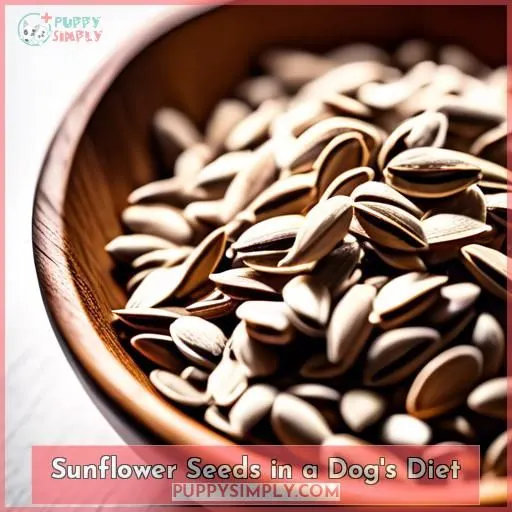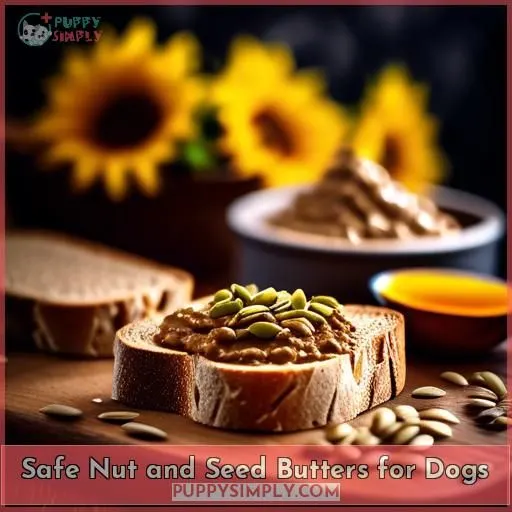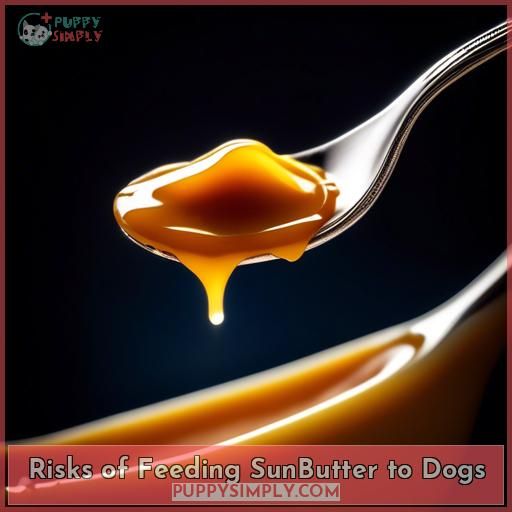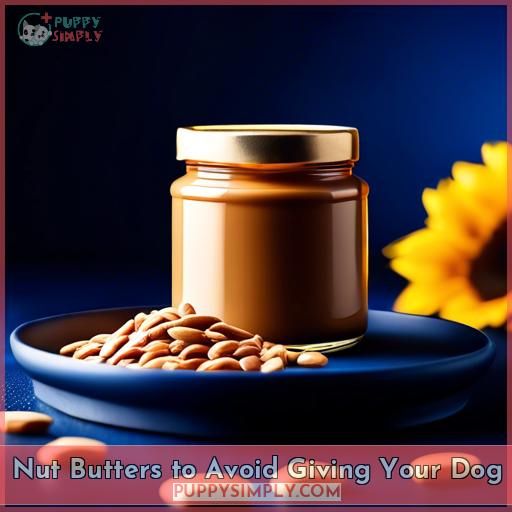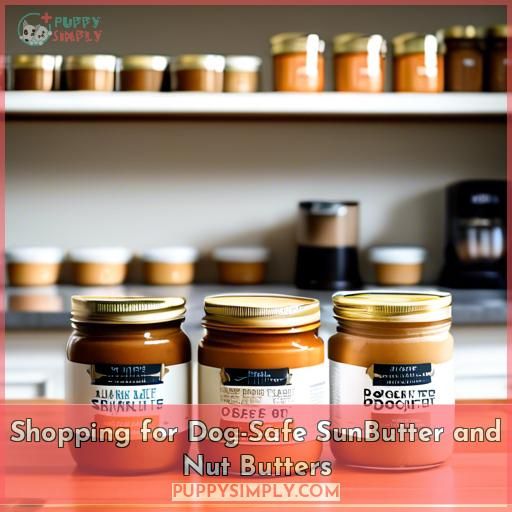This site is supported by our readers. We may earn a commission, at no cost to you, if you purchase through links.
 Let’s uncover the truth about sunbutter for your canine companion.
Let’s uncover the truth about sunbutter for your canine companion.
As a pet owner, you want to provide safe, nutritious treats.
Sunbutter, made from sunflower seeds, offers an allergen-free alternative to traditional nut butters.
This guide explores whether dogs can enjoy this tasty spread, addressing potential benefits and risks.
Discover sunbutter’s place in your furry friend’s diet and learn how to incorporate it into irresistible homemade treats.
Unleash the joy of guilt-free indulgence for your beloved pet.
Table Of Contents
- Key Takeaways
- Can Dogs Eat Sunbutter?
- Understanding SunButter and Its Benefits
- Sunflower Seeds in a Dog’s Diet
- Safe Nut and Seed Butters for Dogs
- Risks of Feeding SunButter to Dogs
- Incorporating SunButter Into Dog Treats
- Nut Butters to Avoid Giving Your Dog
- Shopping for Dog-Safe SunButter and Nut Butters
- Frequently Asked Questions (FAQs)
- Conclusion
Key Takeaways
- Sunbutter, made from sunflower seeds, is a nutritious treat for dogs rich in healthy fats, protein, fiber, vitamins, and minerals.
- Sunbutter can provide health benefits for dogs such as improving coat quality, boosting mood, and offering antioxidants.
- When feeding sunbutter to dogs, moderation is crucial due to its high caloric and fat content to avoid weight-related issues.
- It’s important to choose unsalted varieties of sunbutter, monitor for digestive upset, and introduce it gradually into your dog’s diet.
Can Dogs Eat Sunbutter?
Yes, dogs can eat sunflower butter in moderation. It is a nut-free treat that is a great alternative to peanut butter for dogs with nut allergies or for those who want to avoid nuts altogether. However, it is essential to check the ingredients and avoid sunflower butter that contains xylitol, a sugar alcohol that is toxic to dogs.
Understanding SunButter and Its Benefits
SunButter, made from sunflower seeds, is a nutritious treat for your furry friend, providing healthy fats that can aid in reducing cravings and boosting energy levels. It’s free from the top 8 food allergens, making it a safe choice for dogs with food sensitivities.
Nutritional Value
SunButter is a sunflower seed spread that offers a range of nutritional benefits. It’s made from sunflower seeds, which are rich in healthy fats, protein, fiber, and essential vitamins and minerals.
- Healthy Fats: SunButter contains monounsaturated and polyunsaturated fats, which help to silence cravings, burn flab, and reduce bad cholesterol.
- Protein and Fiber: Each serving of SunButter provides 7g of plant-based protein and 4g of dietary fiber, contributing to a balanced diet.
- Vitamins and Minerals: SunButter is packed with vitamins B1, B6, and B3, as well as minerals like selenium, copper, and manganese, which are essential for maintaining a healthy body.
SunButter is also free from the top 8 food allergens, making it a safe choice for those with allergies. It’s gluten-free and vegan, making it suitable for a variety of dietary needs.
Health Benefits
As you navigate the realm of nut-free treats for your furry friend, you may have heard about SunButter, a spread made from sunflower seeds that offers various health benefits. This alternative to peanut butter isn’t only allergen-free but also packed with nutrients that can enhance your dog’s well-being.
SunButter is rich in essential fatty acids, vitamins, and minerals that can improve your dog’s coat quality, boost their mood, and provide antioxidants to support their overall health. It contains vitamin E, which aids metabolic activities within your dog’s body and offers a defense system against harmful radicals. Additionally, sunflower seeds contain nutrients that can help ease stress in dogs, such as magnesium, vitamin B, and tryptophan, which facilitate the production of serotonin, a hormone that reduces stress and minimizes aggressive tendencies.
While SunButter can be a healthy addition to your dog’s diet, it’s essential to feed it in moderation due to its high caloric and fat content. It’s recommended to serve SunButter as a treat and on rare occasions only, as excessive consumption can lead to weight-related issues such as obesity and gastrointestinal upset.
Incorporating SunButter into your dog’s treats can be a fun and nutritious way to enhance their diet. You can use it as a kong filler, substitute for peanut butter in recipes, or even mix it into their regular food for a tasty twist. However, always remember to introduce new foods gradually and monitor your dog for any signs of digestive upset, such as vomiting or diarrhea.
When choosing SunButter for your dog, ensure it’s from a trusted source and free of added salt, sugar, or artificial sweeteners, such as xylitol, which can be toxic to dogs. Additionally, be aware that SunButter isn’t suitable for dogs with pancreatitis or sensitive stomachs, as it contains a high-fat content that can cause gastrointestinal upset.
By understanding the health benefits of SunButter and its potential risks, you can make informed decisions about incorporating this nut-free spread into your dog’s diet, ensuring they enjoy a balanced and nutritious meal plan.
Allergen-Free Properties
SunButter is a nut-free spread that’s perfect for dogs with allergies or special dietary needs.
It’s free from the top 8 food allergens, including peanuts and tree-nuts, making it a great alternative to traditional nut butters.
SunButter is also free from dairy, eggs, sesame, mustard, and sulfites, making it suitable for a variety of dietary restrictions.
It’s kosher certified and vegan, providing nut-free alternatives for those seeking vegan options.
With its allergen-free properties, SunButter is designed to enhance the quality of your dog’s diet without the complexities of navigating the ever-evolving realm of food allergies.
Sunflower Seeds in a Dog’s Diet
Sunflower seeds are a healthy treat for dogs, providing essential fatty acids, fiber, and vitamins. Feed small amounts as a treat or occasional supplement, avoiding salted varieties and monitoring for any digestive issues.
Nutritional Benefits for Dogs
| Sunflower seed butter, or SunButter, is a tail-wagging treat packed with nutritional content that your dog can share with you. But, keep an eye on portion control and digestibility concerns. Whip up some homemade treats, but remember, moderation is key! | Nutrient | Benefit |
|---|---|---|
| Protein | Muscle health | |
| Fiber | Digestion | |
| Fats | Coat shine |
Feeding Guidelines
- Start with small quantities to gauge your dog’s tolerance to SunButter.
- Avoid feeding SunButter to dogs with pancreatitis or sensitive stomachs.
- Limit consumption to a spoonful occasionally.
- Consult a veterinarian before adding SunButter to your dog’s diet.
- Store SunButter in a cool, dry place to maintain its quality and safety.
- Use SunButter in recipes designed for dogs, such as SunButter cups or SunCups.
- Be aware that cookies may turn green when baked with SunButter due to chlorophyll.
- SunButter is free from the top 8 food allergens, making it a suitable nut-free treat for dogs.
Safe Nut and Seed Butters for Dogs
When it comes to nut butters for your dog, stick to peanut butter, pumpkin seed butter, and sunflower seed butter.
Peanut Butter
Peanut butter is a popular treat for dogs.
However, not all brands are safe.
Some contain xylitol, which is toxic to dogs.
Look for brands like Farm Boy, Kraft, and Whole Foods, which offer all-natural options without added sugars or salts.
Homemade peanut butter is also a good choice.
Ensure proper storage to maintain freshness.
Always avoid salted varieties and shelled peanuts, as they pose choking hazards.
Pumpkin Seed Butter
Pumpkin seed butter is a great alternative to traditional nut butters for dogs with nut allergies or those who need a nut-free treat. Pumpkin seeds are gluten-free and can be ground into a smooth butter consistency. However, it’s essential to avoid pumpkin seed overconsumption, as excessive consumption can lead to digestive issues or pancreatic problems.
When making pumpkin seed butter treats for your dog, you can use the same base recipe as for peanut butter treats, but substitute the peanut butter with pumpkin seed butter. The consistency may be slightly different, so you may need to adjust the recipe accordingly. You can also add pumpkin seeds to the treats for an extra boost of nutrition.
Remember to store the pumpkin seed butter in a cool, dry place to prevent spoilage. If you’re not using it immediately, consider storing it in the refrigerator or freezer to extend its shelf life.
In conclusion, pumpkin seed butter can be a healthy and tasty treat for your dog, but it’s crucial to use it in moderation and ensure proper storage.
Sunflower Seed Butter
Sunflower seed butter is a great alternative to traditional nut butters for dogs with nut allergies.
It’s packed with healthy fats, omega-3s, and antioxidants.
Sunflower seeds come from the kernel, not the hulls, so it’s safe for dogs.
It’s also vegan and gluten-free, making it a versatile choice for many diets.
Sunflower seed butter can be used in a variety of recipes, from cookies to energy balls, and is a nutritious addition to your dog’s diet.
Risks of Feeding SunButter to Dogs
When feeding your dog SunButter, avoid salted varieties, as the high salt content can be harmful. Also, monitor your dog for any signs of digestive upset, as SunButter’s high-fat content can cause gastrointestinal issues in some dogs.
Avoiding Salted Varieties
Switching to unsalted varieties of SunButter can be a game-changer for your pup’s health. Salted spreads might lead to digestive upset, turning treat time into a bellyache bonanza. Stick to the feeding guidelines and consider whipping up some homemade treats with unsalted SunButter.
It’s a simple switch that keeps tails wagging and avoids the risks of salty mishaps.
Monitoring for Digestive Upset
When introducing SunButter to your dog’s diet, keep a close eye on their reactions.
Be on the lookout for symptoms like vomiting, lethargy, or decreased appetite.
It’s advisable to consult with a veterinarian before adding SunButter to your dog’s meals.
High-fat content can cause gastrointestinal upset, and overfeeding can lead to more serious issues.
Monitor your dog’s digestive system and adjust their diet accordingly.
Incorporating SunButter Into Dog Treats
You can incorporate SunButter into your dog’s treats by mixing it into homemade treats like biscuits or freezing it into ice cube trays for a refreshing snack. Just be sure to limit the amount you give your dog, as too much SunButter can cause an upset stomach.
Recipe Ideas
Ready to unleash your inner chef and create some paw-some treats for your furry friend?
With SunButter, the nut-free alternative, you can whip up a variety of treats that will have your dog’s tail wagging.
From SunButter baking to SunButter frosting, granola, dips, and smoothies, the possibilities are endless.
Just remember to keep portion sizes in check and consult with your vet before making any major dietary changes.
Happy baking!
Portion Control
After whipping up those scrumptious SunButter treats, remember, moderation is key. Your pup’s dietary needs hinge on balanced calorie intake, so keep a lid on the treat jar. Portion control isn’t just about curbing waistlines; it’s a cornerstone of health considerations.
So, dollop out those nut-free nibbles sparingly—think of them as the cherry on top of a well-rounded diet.
Nut Butters to Avoid Giving Your Dog
When it comes to nut butters, there are some dangerous ones to avoid giving your dog. Walnut butter, pecan butter, pistachio butter, and macadamia nut butter can all be toxic to dogs and should never be given to them.
Walnut Butter
Walnut butter isn’t safe for dogs. Walnuts contain tremorgenic mycotoxins, which can cause dangerous seizures in relatively small amounts. Additionally, walnuts are high in fat, which can cause an upset stomach in some dogs.
It’s best to avoid walnut butter as a treat for your dog and opt for safer alternatives like SunButter or peanut butter without xylitol.
Pecan Butter
Pecan butter is another nut butter that’s not safe for your dog.
It may contain health benefits for humans, but it’s not designed to enhance your dog’s diet.
Pecan butter can pose allergy risks due to its potential cross-contamination with other nuts.
When it comes to feeding your dog, it’s not merely about what’s healthy for you – it’s about what’s safe and beneficial for your furry friend.
Store-bought pecan butter may not be the best choice.
Homemade recipes can be a more bespoke and tailored option.
Pistachio Butter
Pistachio butter is not recommended for dogs due to several risks.
It contains aflatoxin, a mold that can cause liver damage in dogs.
Additionally, pistachios have a high salt content, which can lead to water retention and kidney damage, especially in dogs with heart conditions.
The shells of pistachios can pose a choking hazard.
They can also break into jagged pieces that may puncture the esophagus or other parts of the gastrointestinal tract.
Furthermore, pistachios are high in fat, which can contribute to pancreatitis, a serious condition in dogs.
Macadamia Nut Butter
As a responsible pet owner, you want to ensure that your dog is only consuming safe and healthy treats. When it comes to nut butters, some are safe for dogs, while others can be dangerous. One such nut butter to avoid is macadamia nut butter.
Macadamia nut butter isn’t safe for dogs. Consuming macadamia nuts can cause suppression of the central nervous system, affecting a dog’s coordination and ability to walk. It can also induce hyperthermia, leading to organ failure. Even small amounts of macadamia nuts can cause severe symptoms, including vomiting, ataxia (lack of coordination), weakness, hyperthermia, and depression.
If your dog has ingested macadamia nuts or macadamia nut butter, consult your veterinarian immediately. Treatment may include vomiting induction, activated charcoal, and a cathartic to help the nuts speed through your dog’s digestive system. In more serious cases, hospitalization may be necessary.
To ensure your dog’s safety, avoid macadamia nut butter and other nuts that aren’t safe for dogs, such as pecans, pistachios, walnuts, and almonds. Instead, opt for nut butters that are safe for dogs, such as peanut butter, almond butter, and cashew butter, in small quantities. Always check the ingredients label to ensure the peanut butter you choose doesn’t contain xylitol, which is highly poisonous to dogs.
Shopping for Dog-Safe SunButter and Nut Butters
When shopping for dog-safe SunButter and nut butters, keep a few key things in mind. First, check the ingredient list carefully – you want a simple, straightforward formula without any added sugars, salts, or other potentially harmful additives. Look for brands that are transparent about their production processes and allergen-free status.
Secondly, consider the convenience factor. SunButter is widely available both in-store and online, so you can easily stock up, whether you need individual servings or bulk quantities. And don’t forget to inquire about international shipping if you have furry friends overseas.
Finally, remember that moderation is key when it comes to nut and seed butters for dogs. Portion control is crucial to avoid digestive upset or weight gain. With a little diligence, you can find the perfect pup-friendly spread to delight your four-legged friend.
- Prioritize clean, minimalist ingredients
- Explore international SunButter options
- Invest in convenient bulk or single-serve sizes
Frequently Asked Questions (FAQs)
How does SunButter affect a dog’s energy levels?
You bet! SunButter’s healthy fats and proteins give Fido a natural energy boost. It silences cravings and burns fat – the ultimate guilt-free treat!
Can SunButter improve a dog’s coat shine?
Absolutely! SunButter’s healthy fats and antioxidants like vitamin E boost a dog’s skin and coat health, giving their fur a radiant shine.
Is SunButter safe for puppies under one year?
SunButter’s nutty delight is pup-approved, but go slow with puppies. Their tender tummies symbolize blossoming potential; introduce sunflow’ry goodness gradually for tail-wagging joy.
How does SunButter compare to other dog treats nutritionally?
You’re right to consider SunButter’s nutritional value for Fido. It packs more protein and healthy fats than many treats — a tasty way to nourish your pup!
Can SunButter cause allergies in certain dog breeds?
Picture a pup licking its chops after a tasty SunButter treat. While generally safe, some dogs may develop sunflower allergies manifesting as itchiness, ear infections, or gastrointestinal issues.
Conclusion
Imagine treating your pup to a spoonful of sunbutter, watching their tail wag with delight. This nutty alternative lets you spoil your furry friend without worries. Although you can safely share sunbutter, moderation is key to preventing tummy troubles.
So explore dog-friendly sunbutter treats, but don’t overindulge – your pup’s waistline and health will thank you.


